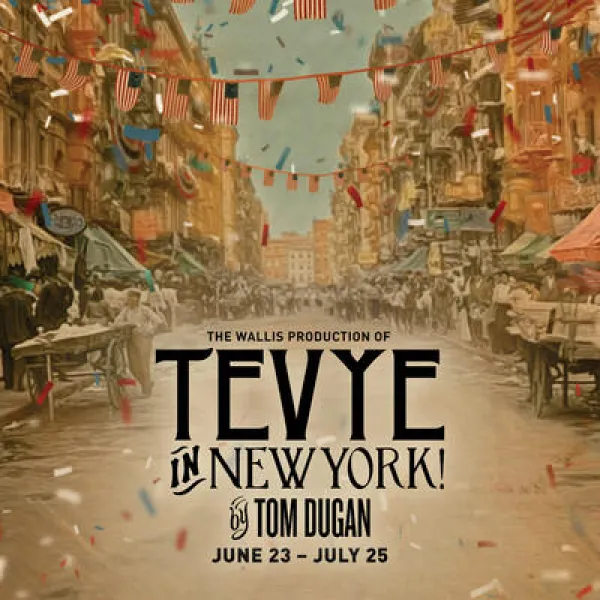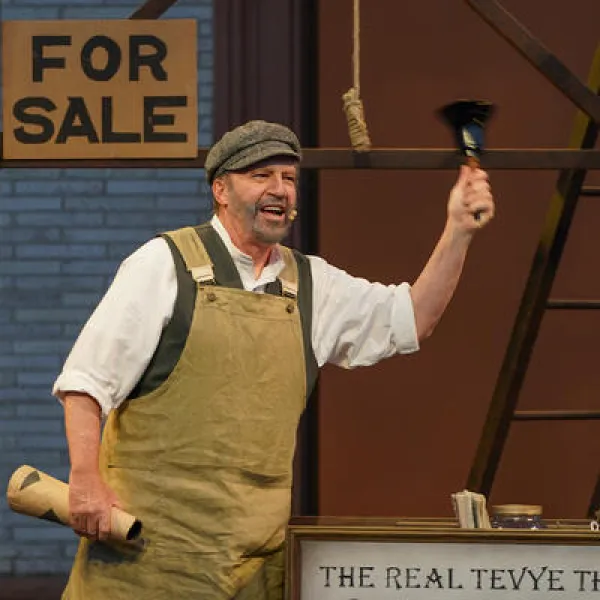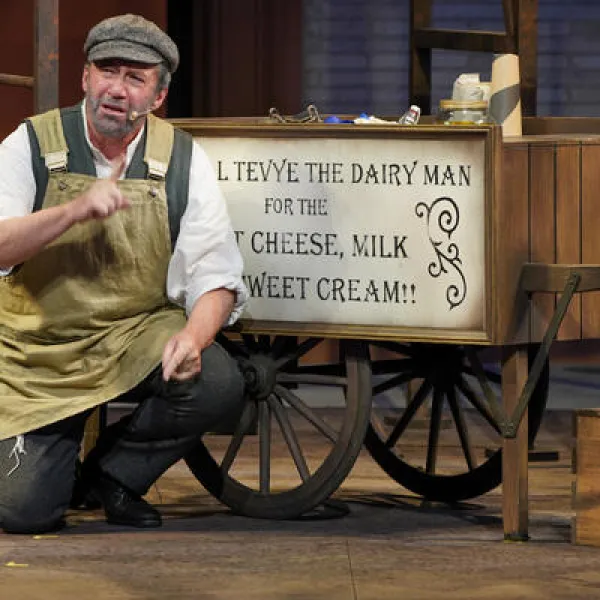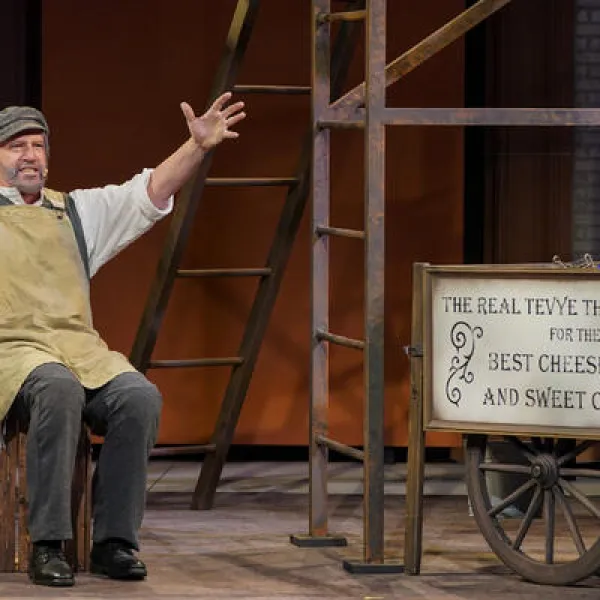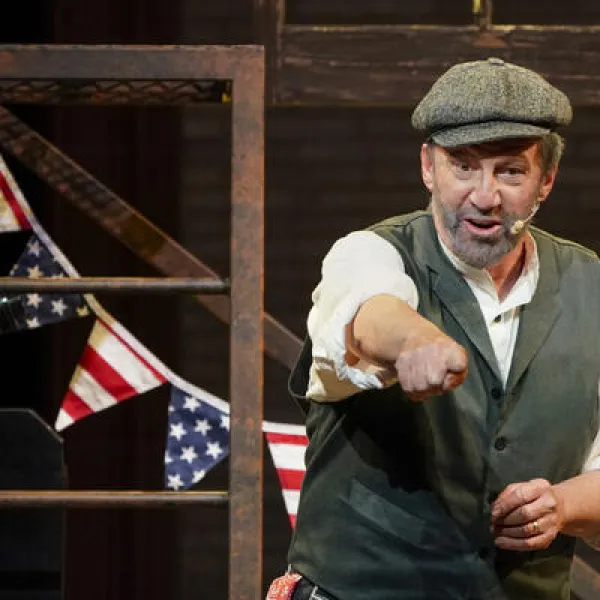As Jews and refugees increasingly come under attack, the Wallis Annenberg Center for the Performing Arts returns to live theater with the world premiere of a play about a Jewish immigrant. Tevye in New York! imagines what happened to the Ukrainian dairyman depicted in the popular Broadway musical Fiddler on the Roof, which in turn is based on Sholem Aleichem’s short stories written in the 1890s. As those familiar with Fiddler may recall, the show ends with a pogrom (race riot) that, with only a three day notice (!!!) expels Tevye and his family from their Ukrainian village of Anatevka, and those beleaguered, bewildered, wandering Jews embark on their long march to America.
Playwright Tom Dugan seems to cleverly pick up Aleichem’s story from there in the format of a 90-minute, one-act, one-man show sans songs and intermission, which he co-directs with Michael Vale. This is very shrewd, as Fiddler’s grand finale is one of the greatest cliffhangers in dramatic history, and if ever a denouement ever simply begged for a sequel, this heartbreaker is the one. In addition, Tevye is a famed character beloved by millions for his trial, tribulations and singing showstoppers such as “If I Were a Rich Man.” As Aleichem’s Tevye tales are almost 130 years old, I am assuming that they and his character (although not the musical play and movie adaptation per se) are in the public domain. If this is indeed the case, Dugan is making out like a bandit, availing himself of a world famous brand name, presumably without spending a single red cent – or kopek – in literary rights to do so. (Just as I imagine Tom Stoppard didn’t pay William Shakespeare a farthing for his Hamlet derived Rosenkrantz and Guildenstern Are Dead.)
Furthermore, Dugan takes on the daunting task of stepping into the milkman’s shoes, playing a role already immortalized on the Great White Way by the indomitable Zero Mostel (Fiddler On The Roof - Prologue-Tradition (1964) - YouTube) and also highly identifiable with Zero’s successor, Herschel Bernardi, as well as Topal, who incarnated the role on both stage and screen (in 1971’s Hollywood version of Fiddler – see: Fiddler On The Roof (imdb.com)). I fondly recall watching Bernardi (see: Herschel Bernardi - "If I Were a Rich Man" - YouTube) tread the boards on Broadway during my boyhood, and more recently, enjoying Topal in his farewell tour wowing the crowds at the Pantages Theater. So, no pun intended, this is quite a TRADITION that Dugan is endeavoring to perpetuate.
And this reviewer is happy to report that as a thesp and a bard Dugan makes a worthy contribution to Aleichem’s stage, screen and literary legacy. Dugan picks up Tevye’s Homeric odyssey that has taken him from Anatevka to his “village” in the New World at Manhattan’s Lower East Side. There, at Delancey and Orchard Street (near where Katz’s Delicatessen and the Tenement Museum now stand!), the storied dairyman parks his pushcart bearing pickles, ice cream, milk, sweet cream and – above all – his enchanting tales, interwoven with the scribe Tevye is really the alter ego of, none other than that Jewish Mark Twain himself, but of course Mr. Sholem Aleichem himself.
Portentously, it’s if the Fourth of July, circa 1914, and Tevye is waiting for an Independence Day parade to be led by President Woodrow Wilson and other luminaries of the other day, including my childhood hero Harry Houdini, that Jew who could escape from anything. Tevye is also awaiting the arrival of one of his six daughters and her son, Daniel, who are finally coming to America through that archetypal portal beside “the Big Green Lady” (as Tevye dubs the Statue of Liberty), Ellis Island.
Tevye and his pushcart are in front of the skeletal façade of a Lower East Side building on an otherwise bare stage, mounted on the Wallis’ brand new, socially distanced Outdoor Terrace Performance Space. This sparse set wrought by scenic designer Michael Vale includes ladders, which Dugan spryly scampers up and down on, and in keeping with the July 4th vibe, the Ukrainian-turned-American citizen festoons the façade with Old Glory pennants.
There, the supreme storyteller spins his sage sagas, relating what happened when the family left the Ukraine and finally wound up in NYC – as my own Kiev ancestors also did circa 1904 to avoid being drafted to fight the Russo-Japanese War (presaging Muhammad Ali, they figured out that unlike the czarists and Cossacks: “No Japanese ever called me dirty Jew!”), which is alluded to in Tevye’s monologues. The dairyman’s sagas also time travel back to the Ukraine to entertain us with vignettes familiar to Fiddler aficionados, including sly references to the musical’s songs, such as “Sunrise, Sunset” (although none are performed, perhaps because of licensing issues re: the music by composer Jerry Bock and lyricist Sheldon Harnick).
It took me about 45 minutes – or half the length of this one-acter – to get drawn into this one-man show, but Dugan’s tall tale of an immigrant adapting to and making good in America finally won me over. He incorporates elements into the plot that I don’t think Aleichem explicitly tackled, such as lesbianism (although the topic of Aleichem and homosexuality has indeed been raised elsewhere; see: The "queer subtext": LGBTQIA+ issues in 20th century Jewish literature | Ben Gladstone | The Blogs (timesofisrael.com)). One of his daughters has married a revolutionary, presumably a Bolshevik, and they are political prisoners in Siberia. Hey, no Jewish saga is complete without some lefty politics!
Speaking of which, 1911’s devastating Triangle Shirtwaist Factory fire is also injected into the storyline as lighting designer Elizabeth Harper imaginatively works her magic, although Aleichem did specifically deal with labor disputes in Motl the Cantor’s Son. Chapter X is entitled “WE STRIKE!” and begins:
“Personally, I think there’s nothing better in the world than striking” and goes on to relate: “all the shops declare a strike. All the tailors and pressers in New York lay down their scissors and irons and—goodbye! Oh my, what goes on then, at home, on the street, and in halls! A hall is a large room or a theater. All the tailors gather from all over New York for a meeting, and they talk, talk, and more talk. You hear words you’ve never heard in your life: general strike, union, organized, forty-eight hours, higher wages, better conditions, scabs, strikebreakers, pickets, and many more words…”
While I don’t think Aleichem wrote at length about the adventures of Tevye per se in the New World, he did write about Jews in Manhattan in his last book. Part of Motl the Cantor’s Son chronicled that title character’s life in NYC and was written shortly before the author’s premature death from TB and diabetes in 1916. Part two opens with a chapter entitled “MAZEL TOV, WE’RE IN AMERICA” and I suspect that Dugan transmogrified Motil’s mother’s health issue into Daniel’s apparent muteness, which threatens to cause an inspector at Ellis Island to deport Tevye’s grandson back to sMother Russia.
(BTW, throughout Tevye in New York! “Russia” and “Russians” are repeatedly referred to, but I don’t believe “Ukraine” – where Aleichem was born and his Tevye tales set – is uttered once. Especially in light of the current Kiev/Moscow imbroglio, it seems culturally insensitive not to call Tevye and his kinsfolk “Ukrainians.” Ukraine was ruled by czarist Russia but is now an independent nation-state. Please reconsider this, Mr. Dugan.)
Was America really the promised land? In the beginning of Motl, when the wandering Jews finally arrive in Yankee Doodle Dandy-land, the character named Pinni – who is described as “It’s worth your while to get to know him: he also has lots of good ideas” – “is very angry at Ellie’s [Ellis] Island because they detain the poor people there but let the rich ones go the minute they get off the ship. He says that’s more like what you would expect from those Russian thieves than from this land of the free.”
While America’s streets may not have been paved with gold, for most refugees – then and now – the USA is generally far better than the place they are being forced to flee from. Today asylum seekers and other, as Emma Lazarus poetically put it, the “homeless, tempest-tost… tired… poor… huddled masses yearning to breathe free, The wretched refuse,” seeking refuge in America’s “teeming shore” are being persecuted. From Trump’s merciless scapegoating of immigrants to Vice President Kamala Harris’ (daughter, no less, of immigrants from India and Jamaica!) declaration at Guatemala, “Do not come,” Tevye in New York! reminds contemporary Jews and other citizens and residents, of America’s fabled history as a land that provided safe haven to the downtrodden escaping oppression and seeking sanctuary and opportunity.
I realize that there is much more to immigration than this, including an all-important indigenous perspective, but this is beyond the scope of what is, after all, a theater review. The essential point is that Dugan is reminding many of us of our immigrant past at a time when hardhearted nabobs of negativism want to slam the door shut and throw up the “Need Not Apply” signs to those running away from death squads, drug cartels, murderous gangs, etc., especially from a destabilized region where U.S. foreign policy, with its endless coups, Contra wars, etc., rendered much of the misery they are trying to escape from. (Don’t get me started!)
And speaking of promised lands, although Tevye in New York! never holds forth per se on Israel, this play also serves as a poignant reminder of when Jews were the underdogs striving for better lives – not a nuclear armed behemoth bestriding the Middle East. Surely, Israeli policies widely perceived as perpetuating apartheid, settler colonialism, occupation and so on don’t help in the current climate of anti-Semitism. Bigots aren’t exactly known for their nuanced thinking and will lash out at whatever “target” is closest at hand. Remembering our own roots as victims and survivors may also serve to remind supporters of ultra-militarism of the Golden Rule: “Do unto others as you would have others do until you.”
This is not the first time Tom Dugan has tackled the thorny subject of anti-Semitism. In 2011 Dugan starred in Wiesenthal, another one-man show he wrote that premiered at Theatre 40 in Beverly Hills, a bioplay about the world’s most famous post-WWII Nazi hunter (see: WIESENTHAL Theater Review | Freepress.org). With his inspiring incarnation of Tevye, Dugan is perpetuating the vast, eternal plan of one of the page, stage and screen’s greatest and most universal Everymans, who has enriched us all by pondering why he wasn’t born “a wealthy man.”
You don’t have to “work hard” or be Jewish to love Tevye in New York! – a real Jewish play. You can “biddy biddy bum” down to see Tevye at the Promenade Terrace of the Wallis Annenberg Center for the Performing Arts, 9390 N Santa Monica Blvd, Beverly Hills, CA 90210, on Tuesdays through Sundays at 8:00 p.m. until July 25. For info: Tevye in New York! at The Wallis; (310)746-4000.



